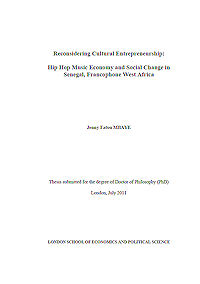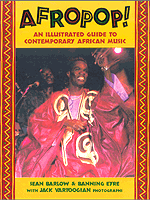mbaye2011
|
Mbaye, Jenny Fatou: |
 CONTENTS
CONTENTS
Part One
Framing the Issue 11
Chapter 1
Framing the Research 12
1.1. Introduction 12
1.2. Contradictions of the music economy 19
1.2.1. On the complexity of the cultural economy 20
1.2.2. On the consumption and production continuum 23
1.2.3. Productive role of cultural mediation or peopling
the cultural economy 27
1.3. On cultural economy and entrepreneurial development 30
1.3.1. Cultural economy and West African development:
(yet) another missed boat? 31
1.3.2. Cultural economy and development: which boat anyway? 35
1.4. Research design 38
1.4.1. Taking West African musical entrepreneurship seriously 39
1.4.2. Structure of the thesis 42
1.5. Conclusion 49
Chapter 2
Operationalising the Conceptual Framework 51
2.1. Introduction 51
2.2. Considering traditional entrepreneurial landscapes 53
2.2.1. Entrepreneurial innovation and creativity 55
2.2.2. On the front of economics and business
management studies 56
2.2.3. From sociology and psychology perspectives 59
2.3. Creative, innovative, cultural entrepreneurship(s)? 61
2.3.1. Cultural and creative innovation 61
2.3.2. Spatialising cultural and creative entrepreneurship 64
2.4. Entrepreneurial communities of practice 68
2.4.1. On the complexity and diversity of cultural and
creative entrepreneurship 70
2.4.2. On the cognitive and pragmatic spaces of West African
musical entrepreneurship 74
2.5. Ideal-typology of West African musical entrepreneurs 79
2.5.1. Local cultural entrepreneurs 81
2.5.2. Cosmopolitan musical entrepreneurs 86
2.5.3. Hip hop entrepreneurs 91
2.6. Conclusion 95
Chapter 3
Hip Hop Transcultural Politics 101
3.1. Introduction 101
3.2. Hip Hop in translation 103
3.2.1. On a hip hop genealogy 103
3.2.2. Mondialisation: beyond binaries 106
3.2.3. Hip Hop as a ‘transculture’ 109
3.3. West African interlude: on Senegalese postcolonial sociality 111
3.4. Métissages of hip hop music 119
3.4.1. Hip hop music as a form 120
3.4.2. Performing hip hop music 122
3.5. On hip hop politics 127
3.5.1. To those who set the borders 128
3.5.2. To those who sit on the borders 132
3.5.3. Hip hop ‘biopolity’ 135
3.6. Conclusion 139
Part Two
Speaking From the Field 144
Chapter 4
Grounding in the Field: Research Design, Methods and Reflexive Analysis 145
4.1. Introduction 145
4.2. Reflection on my role as participant observer 146
4.3. Case study approach 151
4.3.1. Case selection 152
4.3.2. Initial contact 154
4.3.3. Formal interviews 157
4.4. Light ethnography 160
4.4.1. Participant observation 161
4.4.2. Informal interviews 163
4.4.3. Passive observation 165
4.4.4. Journal keeping 166
4.5. Reflexive research design 167
4.5.1. Iterative research design 167
4.5.2. From contextual to internal knowledge 170
4.5.3. Triangulation 173
4.6. Qualified grounded theory: iterative data analysis 177
4.6.1. On qualified grounded theory 178
4.6.2. Thematic coding 180
4.6.3. Theory building 185
4.7. Conclusion 189
Part Three
Situating Musical Practices in Francophone West Africa 191
Chapter 5
Senegalese Framing Of the West African Music Economy 192
5.1. Introduction 192
5.2. Socio-economic history of musical production 193
5.2.1. Traditional functionalist economy of musical production 194
5.2.2. Contemporary popularisations of musical practices 196
5.2.3. On the 1990s and their generational aesthetics 202
5.3. Political economy of Senegalese cultural production 204
5.3.1. State monopolistic politics of cultural production 205
5.3.2. Presidential patronages of cultural production 209
5.3.3. ‘Politics of culture’ as cultural policy 214
5.4. Popular music: the “street child” of ‘politics of culture’ 218
5.4.1. Legal invisibility of musical makers and workers 219
5.4.2. Individualisation of musical practices 226
5.4.3. Nationalist and state copyright system 230
5.5. Conclusion 235
Chapter 6
West African Practices of Musical Entrepreneurship 239
6.1. Introduction239
6.2. Contextualised processes of an intermediating community 241
6.2.1. Spatial proximity of the community 242
6.2.2. Institutional proximity of the intermediation 247
6.3. Situated practices of musical entrepreneurs 253
6.3.1. Mutual engagement: beyond immaterial and
passionate work 254
6.3.2. Joint enterprise: beyond precariousness and insecurity 260
6.3.3. Shared repertoire: beyond informality and trust 268
6.4. Conclusion 278
Part Four
Spatialising Hip Hop Entrepreneurship in Francophone West Africa 282
Chapter 7
Radical Hip Hop Music Economy 283
7.1. Introduction 283
7.2. Textual music-making: on hip hop ethical economy 285
7.2.1. Demonstrating a networked individuality 287
7.2.2. Representing an emotional community 290
7.3. Peer musical production: on a distributed autonomy 293
7.3.1. From an ethnic enclave to a peer productive perspective 294
7.3.2. Ownership of the means of production as condition of
peer production 297
7.3.3. Dynamic business ecology in support to peer production 301
7.4. Communal governance of the hip hop productive
community 305
7.4.1. Equipotential participatory process 306
7.4.2. Meritocracy and ‘benevolent dictatorship’ 309
7.5. Conclusion 314
Chapter 8
Towards a General Conclusion 318
8.1. Introduction 318
8.2. On the hip hop entrepreneurial community 320
8.3. Ideal-typology and beyond “communities of practice” 327
8.4. On social change and hip hop political potential 330
8.5. Research implications and conclusions 335
Appendix A
Interview Schedule 344
Appendix B
Consent Form 349
Appendix C
Primary Interviews Listings 351
Bibliography 355


 CONTENTS
CONTENTS CONTENTS
CONTENTS INHALT (Button Type)
INHALT (Button Type) CONTENTS
CONTENTS